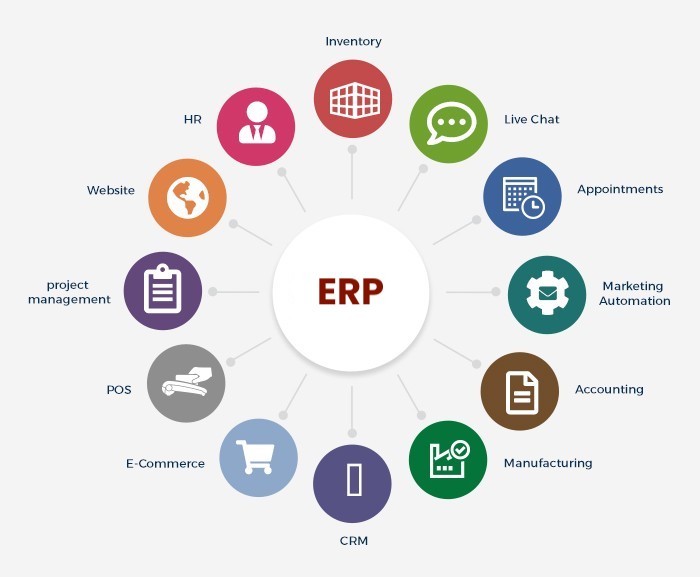In the ever-evolving landscape of modern business, the quest for operational excellence remains a top priority for organizations across industries. To navigate the complexities of today's global marketplace and stay ahead of the competition, businesses require robust tools that streamline processes, enhance collaboration, and drive strategic decision-making. One such tool that has revolutionized the way companies manage their operations is Enterprise Resource Planning (ERP). In this comprehensive guide, we delve deep into the world of ERP, exploring its intricacies, benefits, and transformative potential for businesses of all sizes.
Understanding ERP:
At its core, Enterprise Resource Planning (ERP) is a sophisticated software solution designed to integrate and streamline an organization's core business processes into a unified system. By consolidating data and automating workflows across departments, ERP systems provide a centralized platform for managing various functions, including finance, human resources, supply chain management, manufacturing, and customer relationship management (CRM). This holistic approach enables businesses to break down silos, improve cross-functional collaboration, and gain actionable insights into their operations.
Key Components of ERP:
ERP systems typically consist of a diverse array of interconnected modules, each tailored to address specific aspects of business management:
- Finance and Accounting: ERP software streamlines financial processes such as accounts payable/receivable, general ledger management, budgeting, and financial reporting, providing real-time visibility into the organization's financial health.
- Human Resources: From recruitment and employee onboarding to payroll processing and performance management, ERP systems automate HR tasks, optimize workforce planning, and ensure compliance with regulatory requirements.
- Supply Chain Management (SCM): ERP solutions empower businesses to optimize supply chain operations by managing inventory levels, procurement processes, order fulfillment, logistics, and supplier relationships, thereby enhancing efficiency and reducing costs.
- Manufacturing: ERP systems offer comprehensive tools for managing the entire manufacturing process, including production planning, scheduling, quality control, inventory management, and shop floor operations, leading to increased productivity and quality assurance.
- Customer Relationship Management (CRM): Integrated CRM functionalities enable organizations to centralize customer data, track sales pipelines, manage marketing campaigns, and deliver superior customer service, fostering long-term relationships and driving revenue growth.

Benefits of ERP:
The adoption of ERP brings a multitude of benefits to organizations seeking to optimize their operations and achieve sustainable growth:
- Improved Efficiency: By automating routine tasks, eliminating manual errors, and streamlining processes, ERP systems enhance operational efficiency and productivity across the organization.
- Enhanced Visibility and Insight: ERP provides real-time access to critical business data and performance metrics, enabling informed decision-making, strategic planning, and agile response to market dynamics.
- Streamlined Collaboration: Centralized data and standardized processes facilitate seamless collaboration and communication among departments, suppliers, and partners, fostering a culture of teamwork and innovation.
- Cost Savings and Resource Optimization: ERP helps identify cost-saving opportunities, optimize resource utilization, and minimize waste, leading to significant reductions in operational expenses and improved profitability.
- Scalability and Flexibility: With scalable architecture and customizable features, ERP systems accommodate the evolving needs of businesses, enabling them to adapt to changing market conditions, scale operations, and pursue new growth opportunities.
Challenges and Considerations:
While the benefits of ERP are undeniable, the implementation process can pose challenges and complexities for organizations:
- Resource Allocation and Change Management: ERP implementation requires dedicated resources, time, and investment, as well as effective change management strategies to overcome resistance and ensure user adoption.
- Data Integration and Migration: Integrating disparate systems and migrating legacy data to the new ERP platform can be complex and time-consuming, requiring meticulous planning and execution.
- Customization and Configuration: Tailoring the ERP system to meet the unique needs and processes of the organization may involve customization and configuration, which must be carefully balanced to avoid overcomplication and maintain system integrity.
- Training and Support: Providing comprehensive training and ongoing support to end-users is essential for maximizing the benefits of ERP and driving user adoption throughout the organization.
- Security and Compliance: Ensuring data security, regulatory compliance, and protection against cyber threats are critical considerations in ERP implementation, requiring robust security measures and adherence to industry standards and regulations.
Embracing the Power of ERP for Business Transformation
In conclusion, Enterprise Resource Planning (ERP) represents a powerful tool for businesses seeking to optimize operations, drive growth, and stay competitive in today's fast-paced business environment. By integrating and automating core business processes, ERP systems empower organizations to streamline workflows, enhance collaboration, and make data-driven decisions that fuel innovation and drive success. While the journey to ERP implementation may pose challenges, the rewards are immense for those willing to embrace change, invest in technology, and unlock the full potential of their business. As the digital age continues to evolve, ERP remains a cornerstone of modern business management, enabling organizations to adapt, thrive, and lead in the global marketplace.
Not sure if an IT company is the right fit for you or wondering how to choose a reliable partner? We're here to advise you in the right direction.
What is ERP?